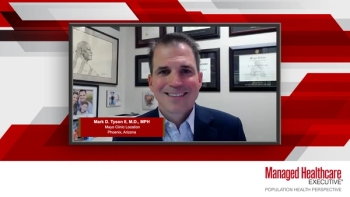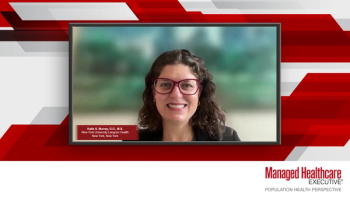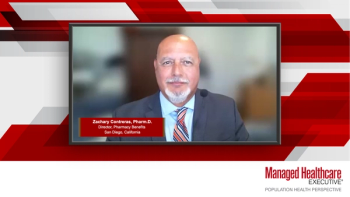Navigating Non-Muscle Invasive Bladder Cancer: A Population Health and Payer Perspective

An expert discusses how recent updates to AUA, EAU and NCCN guidelines have cautiously shifted toward more bladder-sparing approaches for BCG-unresponsive patients, incorporating new FDA-approved therapies as conditional recommendations for those unwilling or unable to undergo radical cystectomy.

An expert discusses how high-cost gene therapies require evidence standards including Phase 3 trial data showing complete response rates and durability, real-world evidence and health economic analyses to guide clinical use and coverage determinations before payers scrutinize their carte blanche approval.

An expert discusses how real-world evidence is driving gene therapy adoption in BCG-unresponsive disease primarily through demonstrated durability and excellent tolerability, with 30% to 40% of patients achieving long-term disease-free survival despite the need for better comparative data to guide treatment selection.

An expert discusses how integrating newer NMIBC therapies faces operational barriers including administration logistics, staff training and formulary restrictions, while solutions require better comparative data, institutional protocols and industry partnerships to overcome unwarranted practice variation.

An expert discusses how clinics can successfully implement gene therapy workflows by establishing strong institutional protocols, assigning dedicated clinic coordinators, and using strategies like rectal diazepam premedication to prevent bladder spasms and medication loss during expensive treatments.

An expert discusses how less frequent administration of therapies like nadofaragene (every 90 days) significantly reduces clinical resource burden compared with combination treatments like gemcitabine-docetaxel, which require extensive logistics, chemotherapy-licensed staff and daily clinic visits.

An expert discusses how community-based gene therapy administration has broadened treatment options for patients with BCG-unresponsive NMIBC by providing easier logistics compared with complex chemotherapy regimens, ultimately expanding bladder-sparing approaches and avoiding radical cystectomy in younger, sexually active patients.

An expert discusses how non-muscle invasive bladder cancer (NMIBC) is a localized form of urothelial cell carcinoma that primarily affects older men with smoking as the primary risk factor, requiring close follow-up due to its highly recurrent nature.

An expert discusses how non-muscle invasive bladder cancer (NMIBC) creates a significant clinical and financial burden with up to 60% recurrence rates, affecting an estimated 85,000 new patients annually and requiring frequent office visits that impact quality of life for this older population.

An expert discusses how patients with BCG-unresponsive non-muscle invasive bladder cancer (NMIBC) now have several FDA-approved treatment options beyond radical cystectomy, including pembrolizumab, gene therapy and intravesical chemotherapy combinations.

An expert discusses how gene therapy represents a breakthrough treatment approach for BCG-unresponsive patients, offering quarterly dosing that reduces treatment burden while showing promising response rates of 50% to 70% in real-world evidence.

An expert discusses how clinicians now face the exciting challenge of selecting optimal treatments from multiple new options for BCG-unresponsive patients, opening opportunities for clinical research to determine the best sequencing and patient-specific approaches.


An expert discusses how health plans establish coverage policies by referring to clinical trials, NCCN guidelines and disease association recommendations, using trial qualifying criteria to draft prior authorization requirements that are then reviewed by specialists before committee presentation.

An expert discusses how health plans must defend all formulary decisions with clinical evidence and use NCCN/AUA guidelines to create treatment pathways rather than traditional tier placements, with BCG-unresponsive cases following a step-therapy approach from gemcitabine/docetaxel to nadofaragene based on cost and toxicity profiles.

An expert discusses how health plans evaluate high-cost NMIBC therapies by examining total cost of care, weighing risk versus reward for treatments like gene therapy that can cost over a million dollars, and using frameworks from NCCN guidelines and ICER to perform comparative effectiveness analyses.

An expert discusses how health plans currently don’t utilize real-world evidence for decision-making due to lack of common standards and limited data at drug launch, but explains that AMCP is developing an RWE framework with different protocols for various drug life cycle phases.

An expert discusses how health plans prioritize the lowest net cost with positive outcomes when comparing administration differences, ultimately focusing on member experience when deciding between quarterly intravesical treatments and more frequent systemic infusions.

An expert discusses how payers face multiple access challenges including high treatment costs exceeding $100,000 per patient, coverage restrictions through prior authorization and operational barriers requiring specialized administration facilities, and proposes solutions like value-based contracting and enhanced patient selection tools.

An expert discusses how BCG-unresponsive NMIBC patients have heterogeneous clinical needs requiring individualized treatment strategies, while P&T committees evaluate new therapies by assessing unmet needs and comparing real-world evidence across single-arm trials.

An expert discusses how long-term durability data at one to two years, rather than short-term three-month responses, provides greater confidence in treatment selection and influences formulary decisions based on comparative efficacy and toxicity profiles.

An expert discusses how treatment decisions must balance short-term burden with long-term benefits while avoiding protocol-driven step therapy requirements, as future comparative effectiveness trials and real-world evidence will better inform individualized patient care strategies.




